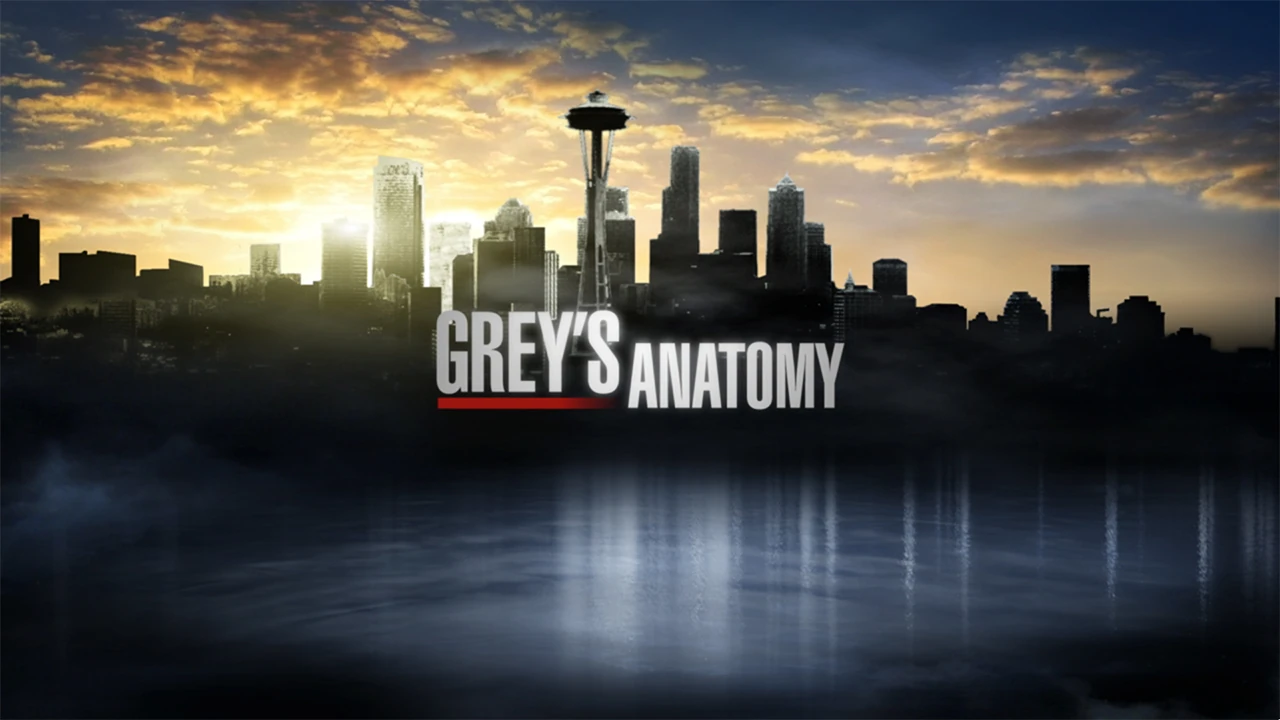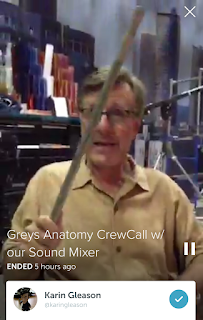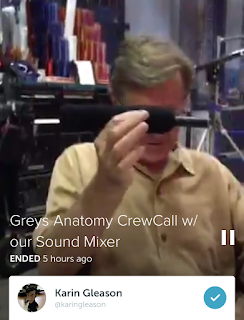 |
| *I do not own this logo. It is owned by ABC's Grey's Anatomy. |
*I am not a professional writer and do not work for ABC, Grey's Anatomy, or anyone involved with this amazing show. (one day-fingers crossed*)
First I would like to apologize for not thinking about doing this for the first Periscope #GACrewCall for the 1st Assistant Director Annette Sutera. Only decided to do this after I saw a tweet on Twitter asking if someone was writing a synopsis/wrapup of the periscope interview for those who couldn't see it live or within its 24 hr window. Or for those awesome fans who came to join in on the fun later then the others (Better late than not at all, right?- sometimes).
On last weeks periscope session (from memory) 1st Assistant Director Annette Sutera discussed how she came into the position after first working for IBM with her engineering degree and feeling that it wasn't a fit for her. She has worked on the show for almost its entirety. Her job focuses on scheduling crew and actors among countless other things. Again, my apologies, feel free to add anything else in the comments that she discussed so I can add it in later.
Beau Baker- Production Sound Mixer
*Content written below is based on what was said directly from the periscope session in a mix of my words and his
Beaux is the production sound mixer for the ABC drama series Grey's Anatomy. He has been working on the show for 11 seasons (since Season 2). His job is to record actors speaking when they're being filmed by the camera. The main goal is to try to record the clearest sound for post production because in post it is easy to add sound to a scene but difficult to cut or separate the sounds. On his team he has a Mixer and 2 Boom operators that handle the boom poles that record the dialogue in the shots. He has been working for about 30 years in the business and 16 years as a mixer. He has worked all over the U.S. and has worked on a couple films in Europe. He is VERY appreciative of his job on Grey's because he can stay local and spend time with his family. Joke: "Never do a job that has midnight or snow in the title" and Grey's doesn't have either.
How did you make being a sound mixer a career decision?
As a USC (University of Southern California) film student he wanted to be a writer/director like many. He was fortunate to visit different film sets and the world of sound became very interesting to him. He was fortunate to start working with a well known sound mixer in his 20s and work with him on jobs that he had. When he started his career he traveled on jobs but when he started a family his main focus was to find jobs close to home.
Challenges of his job?
Some of the greater challenges of his job are (1) that the microphones can't be seen in the screen shots. "Have to be invisible to record their sound." Therefore, he has to be very particular about where mics are placed and hidden. Also (2) microphones "have no brains" so they pick up sound or dialogue that he wants but they also can pick up sound he doesn't want such as cars, background noise, equipment sounds, etc. The microphones can't differentiate what sound the mixer wants and doesn't want from the shot. The microphones have directionality so they can put them directly facing an actor or machine but it can't pick and choose the bits of sound that is trying to be collected on its own.
What determines which Microphone will be used?
If actors are standing at a nurses station or patient table the sound is recorded by microphones held over the actors on boom poles and cue the mic as they speak. If it's a scene where actors are walking & talking they wear small transmitter microphones hidden in their clothes. The action in the scene determines what mic is used in the shot. The goal is to minimize the outside noise as much as possible (engines, ambulance and police sirens)
*Different types of microphones
How was it working on the musical episode of Grey's Anatomy (7.18-Song Beneath The Song)?
That particular episode had people singing. The performers pre recorded their songs and during filming the music was played for them during each shot. A play-back operator was hired to manage the pre-recorded music. The most challenging thing was timing the dialogue perfectly to the pre recorded music. Actors wore ear wigs (costing ~$1,000 each) to hear the songs/music that way music wasn't being recorded while he was recording the background sound and dialogue.
How is the dialogue recorded during the surgical scenes when the actors are wearing masks?
The challenge in the operating room (OR) scenes are that on set, real medical equipment that makes noise such as the heart monitor and suction can interfere with the sound of the dialogue that is being said during filming. Sometimes he will do what is called a "wild track" (also known as wild sound or wild lines) which is when he has the actors run through their lines with the right timing but not actually have the camera rolling so he can focus on recording the dialogue. However, if need be actors do have to do ADR (automated dialogue replacement) to go back a record those particular lines. Because they are wearing masks it isn't as an arduous of a task because since their mouths are covered with the masks it isn't so time consuming trying to match their words to the movements of their previous recorded mouths. However, ADR is avoided when possible so that actors aren't taking more of their time to go to a studio and re-record their lines when so much of their time is already used while filming on set.
What are some must have skills as a sound mixer?
Focus on what it is you do or want to do. If your interested in sound focus on learning the sound. Same goes if you want to work as camera crew, make-up, set design, etc. Listen and learn. Working in film is a trade profession so you want to work with someone as an apprentice. Learn by doing it and watching it being done. All in all, you have to be attentive ("paying attention") and cheerful. You have to work long hours in sometimes hot, wet, cold conditions;" keep yourself happy in your work and you'll go far."
Favorite episode he worked on? (7.07-That's Me Trying)
There is a scene in the episode where there is a mass casualty trauma scene drill. In the scene there is lots of rain in the background and dialogue of the doctors treating the mannequins. He states that it's his favorite episode because despite the strong, loud rain and issues of wetting the microphones he was able to record all the sound during the 3-4 day shoot without requiring looping (another term for ADR). He states it "Was a very prideful moment in my life."
What is the best thing about your job?
Beau states that having two guys working with him on a team has been the best. They've worked together for awhile so they sort of become one entity when it comes to working together to get the task done. The other great thing about sound is he is part of the movie but not part of the "box" (metaphor for the whole scene and all the workers that make it up). So he doesn't have to worry about what others worry about such as if the sets are right, or if the wardrobe matches or other things like that. He works outside and independently of those kind of things. He is "not part of the world that we see, [he] is part of the world that we hear."
Any advice for those trying to work in your same profession?
What you need to do is work hard at finding what you don't know and learning what you don't know. He states that the benefits of today are that there are many ways to record, a regular cell phone is being used in the periscope video that many people are watching now. You don't have to find a film camera and buy the film like was the problem years ago. He states that tech is becoming more affordable, so learn the basics of audio with the affordable technology that is out in the world, if you network you can probably follow around someone or a teacher that that can teach you some things that you need to know. It is a trade craft so "you have to dive in the water and learn how to swim with it."
At the end of the interview he makes a point to thank Executive producer Rob Corn for hiring him. Creator Shonda Rhimes and the writers for writing amazing stuff and the cast for saying the amazing words that we listen to.
Feel free to follow Karin Gleason on twitter at @karinggleason for updates on future #GACrewCall sessions on Periscope. You can also follow Beau Baker at @beaumix or follow along to my random rants at @TheAmandaAponte! Feel free to leave comments below.




Thanks very much, Amanda!
ReplyDelete